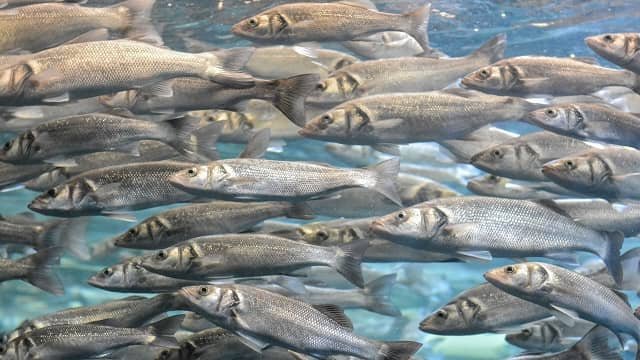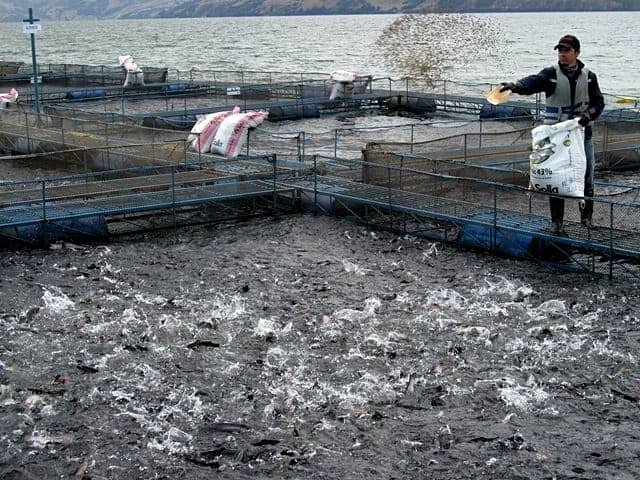
Clay minerals, with their unique structure and composition, are becoming a promising tool to improve water quality in aquaculture environments. These clays can bind and remove organic compounds, creating a cleaner environment for the fish. However, their applications do not end there.
A new study conducted by scientists from Alexandria University and the National Institute of Oceanography and Fisheries (NIOF) examined the potential effects of diets supplemented with bentonite (BN) on the growth, feed utilization, blood biochemistry, and histomorphology of European sea bass (Dicentrarchus labrax).
Bentonite: A Clay with Great Benefits for Fish?
Bentonite, a specific type of clay, has several potential benefits for fish health:
- Improved intestinal health: BN’s binding properties can help remove harmful toxins from the fish’s digestive system.
- Reduced impact of mycotoxins: BN can act as an adsorbent for mycotoxins, mitigating the effects of these harmful fungal toxins in fish feed.
- Enhanced nutrient absorption: BN can play a role in detoxifying antinutritional compounds in the feed, allowing fish to better absorb essential nutrients.
Previous Research is Promising
Studies have shown positive effects of BN on other fish species:
- Reduced aflatoxin levels: In trout, adding BN to the feed significantly reduced aflatoxin, a harmful toxin, in the digestive tract.
- Improved growth performance: Adding BN to catfish diets led to greater growth, feed intake, and red blood cell counts.
- Enhanced stress resilience: BN supplementation in Nile tilapia exposed to lead contamination resulted in better growth and blood parameters.
Bentonite to the Rescue
Scientists investigated the effects of adding BN to the diet of juvenile sea bass. The fish were fed diets containing varying levels of BN (0% to 4.5%) for 84 days. The results were impressive:
- Improved water quality: BN supplementation significantly reduced ammonia levels in the water, creating a healthier environment for the fish.
- Enhanced growth: Sea bass diets with BN showed better growth rates, with the 1.5% BN group (B1.5) showing the most significant improvement.
- Efficient feed utilization: Fish fed BN diets utilized their feed more effectively and required less feed to achieve the same level of growth.
- Improved health: BN appeared to have a positive impact on various health markers. Indicators of kidney function, liver enzymes, and cholesterol levels improved in fish fed BN diets, particularly in the B1.5 group.
- Stronger immune system: BN supplementation seemed to enhance the fish’s innate immune system, with higher levels of red blood cells, proteins, and immune factors.
- Reduced stress: Lower cortisol levels observed in fish fed BN suggest reduced stress levels, potentially contributing to overall better health.
- Healthy organs: Histological examination of key organs revealed healthier tissue structures in fish fed BN diets, particularly at the 1.5% and 3% levels.
Bentonite: A Natural Solution for Sustainable Aquaculture
These findings suggest that including 1.5% BN in the diet can significantly improve the growth, health, and overall well-being of sea bass. Here’s why this is exciting news for the aquaculture industry:
- Sustainable and safe: Bentonite is a natural clay mineral, making it a safe and eco-friendly alternative to traditional additives.
- Cost-effective: Improved feed utilization means less feed waste, potentially reducing production costs.
- Reduced environmental impact: Better water quality due to BN’s ammonia-reducing properties can contribute to a more sustainable aquaculture system.
Conclusion
This research opens the door to further exploration of BN as a natural feed additive for sea bass and potentially other fish species. By adopting sustainable and innovative solutions like BN, the aquaculture industry can ensure healthy, high-quality fish production while minimizing environmental impact.
Contact
Ashraf. I. G. Elhetawy
Aquaculture Division, National Institute of Oceanography and Fisheries, NIOF
Cairo, Egypt
Email: ashrafghazy1101983@gmail.com
Reference (open access)
A., A., Elhetawy, A. I., Refaey, W. M., Y., S., Elebiary, E. H., Lotfy, A. M., & M., M. (2024). Bentonite-supplemented diets improved fish performance ammonia excretion haemato-biochemical analyses immunity antioxidants and histological characteristics of European seabass Dicentrarchus labrax. Scientific Reports, 14(1), 1-14. https://doi.org/10.1038/s41598-024-63936-6
Stay Always Informed
Join our communities to instantly receive the most important news, reports, and analysis from the aquaculture industry.
Editor at the digital magazine AquaHoy. He holds a degree in Aquaculture Biology from the National University of Santa (UNS) and a Master’s degree in Science and Innovation Management from the Polytechnic University of Valencia, with postgraduate diplomas in Business Innovation and Innovation Management. He possesses extensive experience in the aquaculture and fisheries sector, having led the Fisheries Innovation Unit of the National Program for Innovation in Fisheries and Aquaculture (PNIPA). He has served as a senior consultant in technology watch, an innovation project formulator and advisor, and a lecturer at UNS. He is a member of the Peruvian College of Biologists and was recognized by the World Aquaculture Society (WAS) in 2016 for his contribution to aquaculture.







